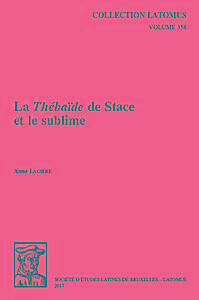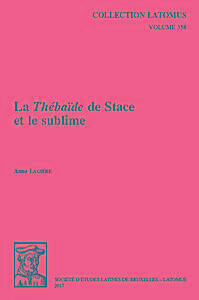
- Afhalen na 1 uur in een winkel met voorraad
- Gratis thuislevering in België vanaf € 30
- Ruim aanbod met 7 miljoen producten
- Afhalen na 1 uur in een winkel met voorraad
- Gratis thuislevering in België vanaf € 30
- Ruim aanbod met 7 miljoen producten
Zoeken
€ 57,00
+ 114 punten
Omschrijving
The treatise On the Sublime, whose author, conventionally referred to as 'Longinus', wrote under Nero and Vespasian, provides a hermeneutic framework that allows avoiding retrospective interpretations derived from modern aesthetic doctrines. As characterized by 'Longinus', the concept of the sublime sheds new light on the Thebaid and helps to better define the poetic world of Statius' epic. The Thebaid and the treatise share certain crucial features: both defend and illustrate a daring and rule-breaking approach to the poet's creative activity; both focus on rushing passions; both favor situations that go against the audience's beliefs and expectations and thus trigger a response that should encompass feelings of terror and admiration. The sublimity of the Thebaid shows itself in the rapture that seizes the poet and his characters, and in the dramatic depiction of horrible deeds and disruptions of nature. Last but not least, one can rely on the treatise in order to explore the generic interplay that is at work in the Thebaid. Indeed, it turns out that Statius, by developing the topic of tyranny, creates a poetics of passion whose tragic dimension clashes with the norms of epic diction and the traditional treatment of heroism. This liberty taken with genre membership accounts for the complex portrayal of characters and actions.
Specificaties
Betrokkenen
- Auteur(s):
- Uitgeverij:
Inhoud
- Aantal bladzijden:
- 300
- Taal:
- Frans
- Reeks:
- Reeksnummer:
- nr. 358
Eigenschappen
- Productcode (EAN):
- 9789042935587
- Verschijningsdatum:
- 31/12/2017
- Uitvoering:
- Paperback
- Formaat:
- Trade paperback (VS)
- Afmetingen:
- 157 mm x 239 mm
- Gewicht:
- 498 g

Alleen bij Standaard Boekhandel
+ 114 punten op je klantenkaart van Standaard Boekhandel
Beoordelingen
We publiceren alleen reviews die voldoen aan de voorwaarden voor reviews. Bekijk onze voorwaarden voor reviews.











